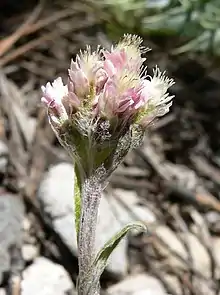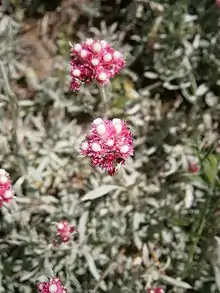Antennaria rosea
Antennaria rosea is a North American species of flowering plant in the family Asteraceae known by the common name rosy pussytoes.[4] Other common names include cat's foot and mountain everlasting.[5] The second part of its scientific name, rosea, is Latin for pink.[6] It is widespread across much of Canada including all three Arctic territories, as well as Greenland, the western and north-central United States, and the Mexican state of Baja California.[7][8]
| Antennaria rosea | |
|---|---|
 | |
 | |
| Scientific classification | |
| Kingdom: | Plantae |
| Clade: | Tracheophytes |
| Clade: | Angiosperms |
| Clade: | Eudicots |
| Clade: | Asterids |
| Order: | Asterales |
| Family: | Asteraceae |
| Genus: | Antennaria |
| Species: | A. rosea |
| Binomial name | |
| Antennaria rosea | |
| Synonyms[2] | |
|
Synonymy
| |
Antennaria rosea is a plant of many habitats, from dry to wet climates and low elevation to very high. It is a very morphologically diverse species; individuals can look very different. It is polyploid and exhibits apomixis; most all the plants are female and they reproduce asexually.[9][4]
This herbaceous perennial grows to a height of 10 to 40 centimeters (4 to 15+1⁄2 in). It has a network of short stolons by which it spreads, its method of vegetative reproduction. It forms a basal patch of woolly grayish leaves 1 to 4 cm long. Blooming early in summer,[10] the inflorescence contains several flower heads in a cluster. Each head is lined with wide, pointed phyllaries which are often rose in color, the trait that gives the species its name, but they may also be white, yellowish, or brownish. The species is dioecious, but since most of the individuals are female, most bear flower heads containing pistillate flowers. The fruit is an achene with a body less than 2 millimeters long and a pappus which may be 6 or 7 mm long. The plant often produces fertile seeds, but most individuals in most populations are clones.[11] Plants are sometimes fertilized with pollen from other Antennaria species, which may bring new genes into an A. rosea population, increasing the genetic diversity amongst the clones.[11][4]
In the UK Antennaria rosea has gained the Royal Horticultural Society's Award of Garden Merit.[5]
- Antennaria rosea subsp. arida (E.E.Nelson) R.J.Bayer
- Antennaria rosea subsp. confinis (Greene) R.J.Bayer
- Antennaria rosea subsp. pulvinata (Greene) R.J.Bayer
- Antennaria rosea subsp. rosea
References
- NatureServe (2023). "Antennaria rosea Rosy Pussytoes". NatureServe Explorer. Arlington, Virginia: NatureServe. Retrieved 17 April 2023.
- The Plant List search for Antennaria rosea
- A.E. Porsild Canad. Field-Naturalist 64(1): 18–19, pl. 3, f. 22 [map] 1950
- Flora of North America, Antennaria rosea
- "Antennaria rosea". www.rhs.org. Royal Horticultural Society. Retrieved 12 April 2020.
- Coombes, Allen J. (2012). The A to Z of plant names : a quick reference guide to 4000 garden plants (1st ed.). Portland, Or.: Timber Press. p. 46. ISBN 978-1-60469-196-2. OCLC 741564356.
- Biota of North America Program 2014 state-level distribution map
- Tropicos, specimen listing for Antennaria rosea Greene
- Bayer, R. J. (1989). A taxonomic revision of the Antennaria rosea (Asteraceae: Inuleae: Gnaphaliinae) polyploid complex. Brittonia 41:1 53–60.
- Taylor, Ronald J. (1994) [1992]. Sagebrush Country: A Wildflower Sanctuary (rev. ed.). Missoula, MT: Mountain Press Pub. Co. p. 154. ISBN 0-87842-280-3. OCLC 25708726.
- Bayer, R. J. (1990) Patterns of clonal diversity in the Antennaria rosea (Asteraceae) polyploid agamic complex. American Journal of Botany 77:10 1313-19.
External links
 Media related to Antennaria rosea at Wikimedia Commons
Media related to Antennaria rosea at Wikimedia Commons- Jepson Manual Treatment
- United States Department of Agriculture Plants Profile
- Calphotos Photo gallery, University of California
- Calflora taxon report, University of California, Antennaria rosea E. Greene Rosy everlasting, rose pussytoes, rosy pussytoes
- Southwest Colorado Wildflowers
- Dave's Garden
- Turner Photographics Wildflowers of the Pacific Northwest
- National Park Service, United States Department of the Interior, Native Plant Network, Glacier National Park, Antennaria rosea Greene
